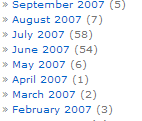One of my English teachers in high school liked to say that at that level, we’re not actually learning history, we’re actually just learning History’s Greatest Hits. At the time I just laughed it off as a silly joke (he made lots of those), but, over time, I realized he was right. You go through school and get an overview of history (and just about every subject) by hitting the high points so you’re not completely ignorant of how the world and the US got where they are today. But the thing is, there’s so much history (and more of it all the time!) that it’s impossible to know it all. If you’re interested, though, you will go beyond the bare minimum required to pass your high school (and even college) classes. Most of us, though, probably don’t care about that kind of history enough to do more than watch the occasional documentary on PBS, or whatever Drunk History counts as. So, we know some history, but historians, people who love history, know lots more. That sounds obvious, but they do more than watch documentaries in order to feel smart. They do research: they read books (the horror!), they talk to other historians, they visit historic places, and so on. They know that there is more to history than everyone was required to learn in school, and they know that knowledge is out there, they just have to go get it. A lot of times they’ll specialize in one particular area and learn everything they can about it.
You probably think that being a hardcore historian is probably not for you, though. You may not care if Shakespeare actually wrote all his plays or not. You may think that Socrates is just some dead Greek dude who was the subject of a few jokes in the first Bill & Ted movie. Besides, you like video games (well, if you’re reading this site, there’s a pretty good chance that you like video games). Video games are way better than boring old history any day of the week.
But what about video game history?
Felipe Pepe wrote an intresting article on Gamasutra the other day lamenting that a lot of so-called ‘hardcore gamers’ don’t know much about the history of video games past five or ten years or so ago.
That is a disappointing realization.
Video games are becoming (or maybe have already become) a mainstream form of entertainment for everyone, but they’ve been around in one form another since at least the late 1940s. No, that’s not a typo.
Warning: From this point on, I’m going to probably sound like either a hipster or an old man yelling at a butt. You have been warned.
When I say “retro gaming” or “old video games” what do you think of? I’m going to guess that it’s Super Mario Bros or The Legend of Zelda. Maybe just the NES, Super NES, and maybe even the Genesis. Possibly Pong. You may even know that Pong was a big deal in the 80’s. It was, but it was an even bigger deal when it came out in 1972.
You may have heard about the Commodore 64, but do you know anything about it? Can you name five games for it without looking them up? Have you ever heard of the VIC-20? The PET? The Commodore 16? The Commodore 128? The Amiga? Do you know who Jack Tramiel was? Do you know why Bill Cosby is an important figure in Commodore’s history?
You might have heard about the Atari 2600, but what about the reissued Atari 2600 Jr.? The Atari 7800? The Atari 8-bit line? Do you know who Nolan Bushnell is?
Did you know that Texas Instruments had a line of computers that played games? Did you know that the TI-99/4A is actually a revised model of the TI-99/4? Did you know it supported a voice module to enable real actual speech? Do you know who its spokesperson was and why that’s important?
Do you know why games like Diablo are called ‘rogue-like’?
More importantly, have you ever actually played these games that are more than 5 years old? How about 10? 20? Further back? I don’t mean ‘load them up in an emulator and fart around with one for five minutes’, I mean actually play them for a decent amount of time. Try to finish one or set a high score (without abusing savestates, natch). Did you play something outside of the games you’ve heard of (the ‘video games greatest hits’)?
The Problem
While doing some independent research on Ironsword, the game infamous for having Fabio on the label, Wikipedia cites a GameSpy article that says:
You wouldn’t know it from the cover, but IronSword is actually a sequel to Wizards & Warriors. But thanks to the presence of Fabio on the cover, gamers got confused and thought they had accidentally picked up one of their mom’s romance novels.
It also posts a cropped picture of the label (with Fabio’s Fabulous Hair) with the caption that “Anything Fabio is involved in becomes automatically bad.”
I suppose the author was trying to be funny, I get that. But it’s pretty clear that the image was cropped to make that joke, since the full image clearly has, “Ironsword: Wizards & Warriors II” at the top of the label. And, I guess I could mistake a video game for a book if I had never seen a book or a video game before. And the game itself is actually pretty good.
The problem is threefold:
- Old consoles are hard to find, take up room to store, and emulating games is questionably legal.
- A lot of writers for big sites are in their 20s. That’s not necessarily a problem, but a lot of these games came out before they were born, and since old consoles are tough to find, they probably won’t bother. They just rely on Wikipedia, cruddy Youtube videos, and other sources of second-hand (or even third-hand and fourth-hand) information.
- Since old consoles are hard to find, and a lot of people won’t bother trying to find or buy them anyway, the echo-chamber effect starts to take over. For instance, Phalanx for SNES usually gets lambasted as having a dumb box featuring a hillbilly playing a banjo. The game must be terrible, whatever it is, right? Wrong. It’s a passable shoot-em-up. Or, ET for the Atari 2600 is the worst game ever made, right? Nope. ET isn’t even the worst game on the Atari 2600 (Sneak ‘n’ Peek, for example). Custer’s Revenge gets a bad rap as one of the worst games ever made (and it is bad, don’t get me wrong), but it was one of those porno games, like Bubble Bath Babes on the NES (don’t Search for these games at work). It was never sitting on the shelf at your local Hills next to Kaboom and Chopper Command.
What all this means is that we have a lot of people writing authoritatively on things that they know very little about. It’s like if you were writing for a music website, but the only thing you knew about music older than 10 years is the songs from your local radio station’s 80’s dance mix, and you just assume that everything pre-1970 is either The Twist or the Foxtrot.
So, what’s the solution?
Unfortunately, I can’t demand that everyone writing about video games broaden their horizons in any meaningful way (if only). But what I can do is demand excellence, both from myself, and from the publications that I read. At the risk of being labeled a pedant and a hipster and a fogey, I can point out why your top whatever list is dumb and wrong, like this list of the 100 best games of all time that only has one game made before 1990 on it (which is Mega Man II. That’s not even the best Mega Man game on the NES).
I don’t want the industry, the consumers, or the media to forget what got us here. I don’t want the past 50+ years of games distilled down to Pong, Pac-Man, some NES stuff, and then everything else. I want to be able to discuss Pix the Cat as being a cross between Pac-Man Championship Edition and Flicky without someone not knowing what I’m talking about. We need to have one eye on the past and another on the future. And a video camera on the present, I guess? I’m not good with metaphors. Video games have a vibrant history, and a lot of that history directly shapes what we have today. Several of those experiences have not been duplicated. They may have been refined or cast off as the medium evolves, but when we study them, it helps us to know why things are now the way they are.

